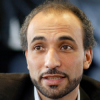Tariq Ramadan

Tariq Ramadan
Tariq Ramadanis a Swiss academic, philosopher and writer. He is the professor of Contemporary Islamic Studies in the Faculty of Oriental Studies at St Antony's College, Oxford and also teaches at the Oxford Faculty of Theology. He is a visiting professor at the Faculty of Islamic Studies, the Université Mundiapolisand several other universities around world. He is also a senior research fellow at Doshisha University. He is the director of the Research Centre of Islamic Legislation and Ethics, based in...
NationalitySwiss
ProfessionWriter
Date of Birth26 August 1962
CountrySwitzerland
For me I made it clear that I wanted to meet with both sides of the political spectrum.
When Manuel Valls says there's nothing to understand because "understanding is justifying," he echoes back to Georges W Bush's logic in 2001. When François Hollande says "they are attacking us because of who we are," what does it say about victims in Mali, Baghdad, Ivory Coast or Turkey?
IS [Islamic State] has played a major role in helping Bashar al-Assad to reposition Syria on the international scene. Now, it is almost impossible to come up with a solution that would exclude him. The political game appears to be very cynical indeed.
Those organisations, al-Qaeda being the first one, have all settled in areas full of mining and oil resources or in geostrategic zones. They settled in Afghanistan which underground is filled with oil and lithium. North Mali is filled with mining resources (uranium). It is essential to question the impact and role of some international players that create or let those organisations settle there.
Saying that the origin of the Islamic State (IS) is within the Muslim Brotherhood organisation only strengthens IS.
If we agree to say that those terrorists are indeed Muslim, I have no problem whatsoever to condemn their actions. I won't apologise though, or justify my point of view.
I have never, so far, in all the studies I have done, met a contradiction between what the human, experimental and natural sciences are telling us and the Islamic rules. In fact, the opposite is true: anything that is coming from the modern sciences is helping me better understand the text. It's not a contradiction. It's a relation.
There are certain things that we cannot understand, like why we pray five times a day, for example. But the fact that we choose to pray is understandable.
The problem, once again, as in all sciences is the attitude of the mind that is dealing with whatever field. The problem is not philosophy but the lack of intellectual humility. It is when reason becomes arrogant that we lose track. But intellectual humility with science: this is spirituality - this is the way we are with God. So we should not be scared and we must reconcile ourselves.
I am dealing with people with both sides. I see people who are liberating themselves but they want to forget the world. And I see people who want to liberate the world but they forget themselves. Neither is the way I want to go.
Very often when I see people who are perceived to be, or who call themselves progressives, sometimes I see an imbalance. Yes I understand the courage in their mind but I don't see the spirituality in their heart, good you are questioning the limits, but what about yourself, are you also liberating yourself?
An 'Islamic economy' or 'Islamic finance' doesn't mean anything to me. But I do think that in the multi-polar world, it is time to find new partners, to find a new balance in the economic order. And this could help you to find an alternative way forward.
The Turkish road is not my model because I am critical of the way you are dealing with freedom of expression, of how you are dealing with the treatment of minorities, and your economic vision.
When terrorism is directly aiming at Western countries, it is automatically and abnormally enlarged in order to instill emotions and fear. However, when attacks happen in the Middle East, is it conveniently downplayed and less talked about. Unless they would benefit more from a heavy coverage.